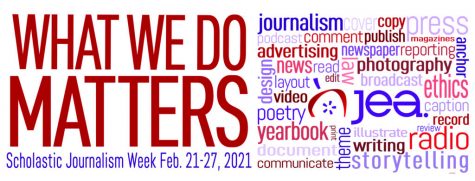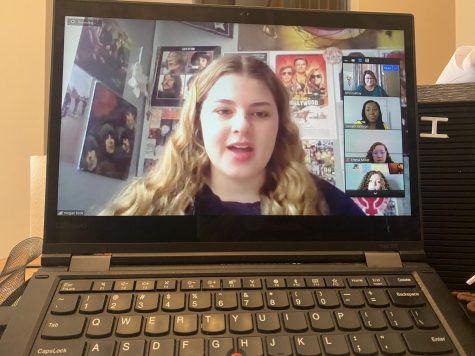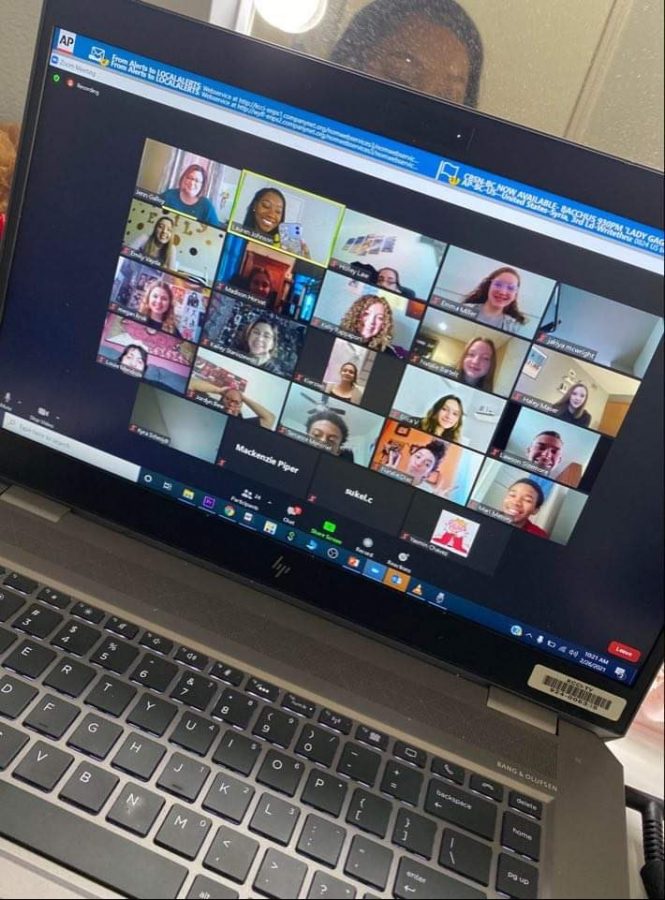Diversity and Adversity in the Newsroom: A conversation with reporter and JT alum Lauren Johnson
Lauren Johnson joined Multimedia Journalism students via zoom on February 26th in honor of Scholastic Journalism Week.
March 5, 2021
During the Journalism Education Association’s 2021 Scholastic Journalism Week, the Tiger Tales staff followed this year’s theme of “What We Do Matters” by extensively discussing and focusing on the importance of journalism and diversity in the newsroom. To conclude the week, the staff received a special visit from Joliet West alumnus Lauren Johnson to have a more in-depth discussion about these topics with the professional reporter herself.

 Johnson graduated from Joliet West in 2014—and has come a long way since spending her days in the Tiger Tales publication office all those years ago. The Columbia College graduate was previously employed at KSN located in Joplin, Missouri, and now works as a multimedia journalist in the Des Moines news station KCCI.
Johnson graduated from Joliet West in 2014—and has come a long way since spending her days in the Tiger Tales publication office all those years ago. The Columbia College graduate was previously employed at KSN located in Joplin, Missouri, and now works as a multimedia journalist in the Des Moines news station KCCI.
With all of the long hours, being miles away from family and friends, and constantly having your work under a microscope, Johnson expresses that journalism is a daunting career to get into. Having thick skin is necessary for survival in this field of work. “It’s a matter of not staying down when you feel intimidated,” the reporter encourages.
Despite some of these negatives, however, Johnson understands how important her work truly is. “The world needs journalists,” she remarks, “there’s so many things people pick on us about, but if we weren’t here asking those tough questions, the world wouldn’t have known so many important things.” Now more than ever, she also understands how greatly a diverse newsroom can impact the communities she is representing through those important stories she tells.
At Johnson’s last position in southwest Missouri, she explains how, in comparison to Joliet, the community she was in was predominantly white and conservative. Yet, they had Black Lives Matter protests that she felt needed to be broadcasted. This is where Johnson feels a diverse newsroom is crucial. She explains that a newsroom lacking diversity would not do a particular community justice, as so many other groups in that area may be overlooked and not recognized.
“Diversity starts with who’s in your newsroom, and they need to come from all walks of life,” she continues, “it’s so important to have that type of diversity in the newsroom so it opens the scope of what types of stories you are going to tell.”
In those communities that lacked diversity, Johnson did her part to make minority voices heard by providing a platform for them. She made it a priority to find people of color to interview. She wanted to make sure that her stories were fully representative of the community she was reporting on.
With this, a diverse newsroom also helps Johnson check her own bias in her reporting. As a Black woman, she felt connected to her Black Lives Matter story in that small Missouri community on a very personal level. Through a diverse newsroom, Johnson comments that she can flesh out her stories with others to check her bias. A diverse environment allows for unbiased storytelling while also bringing different perspectives to the newsroom.
All things considered, Johnson feels that if you believe a story needs to be told, you must stand up for yourself and tell it, even if it’s controversial. “Typically if you’re on a story where people are getting mad or you’re getting pushback, you are on the right track,” she playfully advises. Circling back to the significance of her job, Johnson feels journalism is crucial because it asks those tough questions in order to spread the truth to her audience, whether or not they agree with what she has to say.
Looking forward, Johnson hopes to one day continue her impactful work closer to home in Chicago. Although being away from family, working long hours, receiving criticism, and dealing with controversies, Johnson reassures that her work in journalism is self-fulfilling, gratifying, and even life-changing.
Taking into account what Johnson and the 2021 Scholastic Journalism Week represents, the Tiger Tales publication has made it a priority to cover a diverse range of stories. Senior and Editor-in-Chief of Tiger Tales Lawson Sizemore explains why diversity needs to be a major part of this publication, “Diversity is very important as a publication staff because our job is to report for the people, so by us being diverse not only makes us more credible and reliable, but we are then able to represent the people through our reporting.” Especially when reporting on an incredibly varied area like Joliet, making sure every perspective is listened to will make this publication a more accurate representation of our community.


